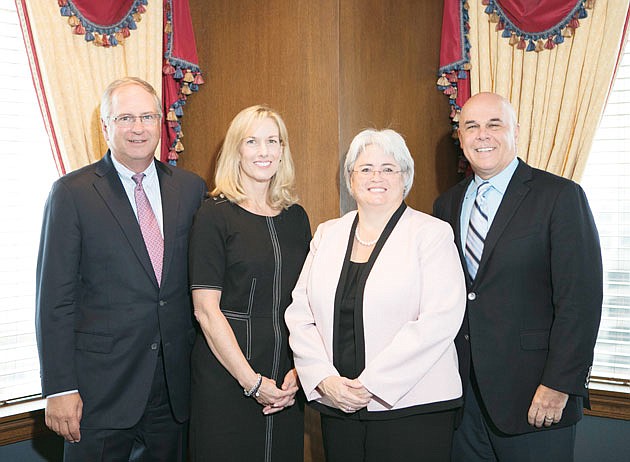- July 26, 2024
-
-
Loading

Loading

As CEO of Tech Data, Bob Dutkowsky oversees a business with more than $36 billion in revenue that sells $150 million of inventory daily to more than 100 countries.
But “none of that matters if people aren't engaged in what we do,” he says. The fundamental ingredient in a successful company, he adds, is “acknowledging the importance of people.”
Tech Data, he admits, has not always been the best at making that clear. The company was so focused on processes, he acknowledged at a recent panel discussion at USF, that “we had forgotten about our people.”
That's why the Clearwater-based company recruited Beth Simonetti for the role of chief human resources officer, reporting directly to Dutkowsky. The company's previous head of HR was several levels from the top. By giving Simonetti, with more than 20 years in top corporate HR roles, access to top senior leaders, Tech Data, says Dutkowsky “made a large statement to our people that our people are just as important as finance, accounting or sales.”
Dutkowsky's confessional came up during USF's “Aligning Business Strategy with People Strategy” panel event, which attracted more than 200 local businesspeople in early October. In addition to Dutkowsky and Simonetti, panelists included Florida Blue and GuideWell CEO Patrick Geraghty and Chief Human Resources Officer Amy Ruth. The following are some of the lessons learned from the event:
Over communicate: Geraghty made the head of communications one of his direct reports, along with human resources. The company has grown from a one-state company six years ago to now doing business in 25 states. “Communication is absolutely critical as you are diversifying,” he says.
To communicate strategy, Geraghty blogs and hosts town hall meetings. His hour-long town halls are 75% Q&A. It's important, he says, to “get in front of people without prepared presentations.”
• Link in: Linking people strategy to business strategy is a new undertaking for Tech Data. The company made it a priority during a major acquisition. “(Now) we make sure that the employee population understands why we did the acquisition,” Simonetti says. “If you can keep employees engaged and linked to why you are doing it, it makes for all the better outcomes.”
During Tech Data's earnings call this month, Simonetti was featured as a presenter. The move makes it clear that “our success going forward with the acquisition and integration is just as much about the people as it is the financials,” she says.
• Diversified approach: Six years ago, Geraghty had eight males reporting to him at Florida Blue. Today his executive table includes four women and three men. “That is not just about 'we need to balance,'” he says. “We need to have the best people in the roles.” He also realized that as a health services company, they were selling to the woman in the family — “Why wouldn't we have women in leadership roles?”
• High level: “Jobs for executives are pretty lonely roles,” Dutkowsky says. The nice thing about having HR at the executive table, he says, is Simonetti has become the “unofficial confidant of the executive team.” She helps coach them through ideas and initiatives they bring to his attention.
• Reward risk: A leader has to “reinforce the idea that there is no retribution for taking a risk” by asking a question or posing a suggestion, Geraghty says. “Unleash people's ability to share with you what they have on their mind. If they're threatened, they're not getting that and it stifles innovation.” Executives should encourage contrarian views, he adds.
• Share yourself: Vulnerability is important when working with people, says Geraghty. “Often the person in charge wants to look perfect, but sharing yourself makes you accessible,” he says. “I want candor (with my team.) If we agree 100% of the time, one of us is useless ... Share yourself in a way where you're not trying to lead people with data points, but trying to lead people with passion and a commitment to what matters.”